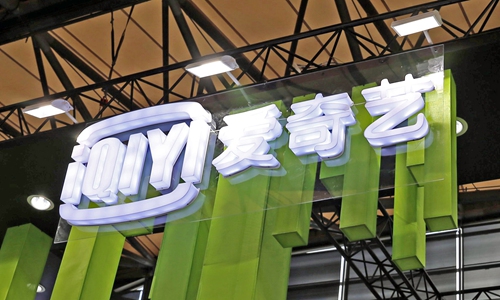
iQIYI Photo: cnsphoto
The economic affairs authority of Taiwan launched a new rule targeting technology giants iQIYI and Tencent from carrying out "illegal operations" in Taiwan without an official license, which experts said is a move that reflects Taiwan Democratic Progressive Party's desire to follow in the US footsteps and create problems via political manipulation in an attempt to diverge from the mainland.
The authority has given OTT-TV 14 days notice, after which the plan will be officially announced on September 3, according to a statement by the Taiwanese economic affairs authorities on Tuesday.
An OTT media service is a streaming media service offered directly to viewers via the internet, meaning it bypasses cable, broadcast, and satellite television platforms, and therefore any local controls too.
The Chinese streaming platform iQIYI applied in 2016 to invest in the Taiwan region and set up a subsidiary, but its OTT-TV business belongs to a sector closed to mainland individuals and companies for investment. iQIYI's application was therefore not approved.
The notice says that it is prohibited for organizations or legal representatives in Taiwan to provide agency, distribution, or engage in any way with OTT-TV and its intermediaries or related commercial services with groups and individuals from the mainland during the notice period of 14 days, which will expire on September 1.
"OTT mainly deals in video, private meetings and other businesses, and as the two sides communicate with each other, the demand for such businesses in Taiwan will only increase," Xiang Ligang, an industry analyst, told the Global Times.
"Taiwan people enjoy mainland video programs, especially TV dramas, but cannot watch them through formal channels - only via OTT-TV," adds Xiang, noting that there are many similar Taiwanese businesses, but all of which enter the market through agents.
In July this year, the Taiwan communications authorities adopted draft measures on the management of internet audio-visual services to cater to OTT service providers both in and outside the region. Such an approach is considered an attack on OTT practitioners on the mainland, and has also been referred to as "iQIYI, Tencent terms" in Taiwan, the Xinhua News Agency reported Wednesday.
